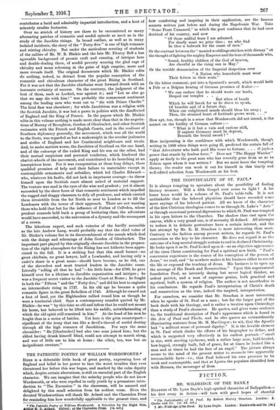THE INDIVIDUALITY OF ST. PAUL.*
IT is always tempting to speculate about the possibility of finding literary treasure. Will a fifth Gospel ever come to light ? A far lesser boon would be a volume of St. Paul's table-talk. It is not unthinkable that the beloved physician should have recorded some more sayings of his beloved patient. All we know of the character of the first Christian theologian cornea to us through St. Luke's " Acts " or through occasional personal digressions to which St. Paul was tempted in his open letters to the Churches. The shadow thus cast upon the canvas, while a very grand one, is of necessity ill defined. All attempts to reduce it to definite portraiture have a certain interest, and the last attempt by Mr. R. H. Strachan is more interesting than most. Contrary to the fashion among present writers, he regards St. Paul's conversion as the key to his character. Ho does not regard it as tho outcome of a long mental struggle certain to end in declared Christianity. He looks upon it as St. Paul looked upon it—as an objective appearance of the risen Christ constituting for Paul a spiritual now birth. " Paul's conversion experience is the lource of his conception of the person of Jesus," we read, and " he nowhere makes it his business either to record the life or expound the teaching of Jesus. His business is to open up the message of His Death and Resurrection." Upon this supernatural foundation Paul, an intensely daring but never logical thinker, an ardent patriot, and a man of supreme genius, both practical and mystical, built a system of religion. The author is not unorthodox in his conclusions. He regards Paul's interpretation of Christ's death and resurrection as the true, indeed the inspired, interpretation.
For ourselves, wo consider that Mr. Strachan is most interesting when he speaks of St. Paul as a man ; but far the larger part of the book deals with his theology, and is rather a treatise upon Christology than a study of Paul's character. He quotes, and gives some credence to, the traditional description of Paul's appearance which is found in the Acts of Paul and Thecla, and he also quotes an extraordinarily illuminating sentence from Mr. M. MacGregor ; to wit, that the Apostle had " a militant sense of personal dignity." It is the lovable element in St. Paul which eludes the efforts of his biographer to define, and which is suggested very effectively in his earliest portrait—" small in size, with meeting eyebrows, with a rather large nose, bald-headed, bow-legged, strongly built, full of grace, for at times he looked like a man and at times he had the face of an angel." The picture always seems to the mind of the present writer to reconcile two apparently irreconcilable facts—i.e., that Paul believed his own presence to be weak and contemptible, and that at Lystra the populace identified him with Hermes, the messenger of Zeus.






























 Previous page
Previous page